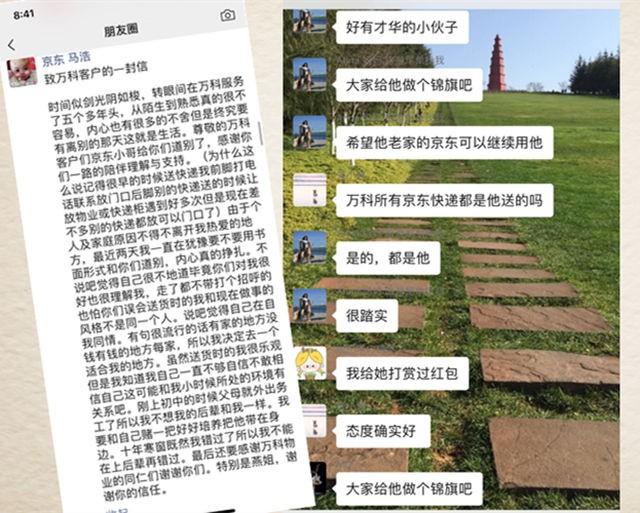by Ella Kidron
When Ma Hao (马浩) a JD delivery courier in Shanghai wrote a goodbye letter to his customers at the end of July, the last thing he expected was to become a phenomenon. He was just doing what he thought should be done, as he has always done.

Ma Hao dressed in his signature red JD Courier uniform standing in front of his delivery tricycle
For the last five years, Ma has serviced the Vanke Dream City (松江万科梦幻城) apartment compound in the Songjiang suburb of Shanghai. The apartment compound has 38 buildings, and nearly 2000 residents. Ma delivers 160 packages on average each day, all the way to customer’s doorsteps, as is required by JD. Ma knows 70-80% of the compound’s residents personally, and over 200 of them have exchanged WeChat contacts with him for ease of communication. A favorite among residents’ children, sometimes after he’s delivered a package and is preparing to leave, the kids will chase after him just to say hello.
Recently, he made a personal decision to transfer from Shanghai to Changzhou, Jiangsu province, which is his hometown. He left a note to his customers in his WeChat moments to let them know the news and thank them for their support and understanding.
As he expresses in the letter, Ma’s thinking in posting the letter was simple – he wanted to earnestly say goodbye to his customers, but he was worried about making too much of a fuss of his departure and disturbing them. It goes without saying, however, that he was also worried that the residents would mistake his behavior over the last five years as false enthusiasm and politeness, if he didn’t so much as say goodbye. Ultimately he made the decision to post a note to the residents on his WeChat moments, striking a balance between not saying goodbye, and avoiding feeling like he was being a nuisance. Although simple in prose, the letter reflects Ma’s true feelings towards his time with the residents, as well as the relationship he’d built with them.

Ma’s letter (left) and residents praising him in a WeChat group (right)
Ma joined JD in June 2015 with the aspiration to provide a better life for his family and make good on his debt from buying a home. He hadn’t imagined forming a deep bond with the apartment complex residents as he did, and earning the nickname of “Brother Ma” (小马哥) as a result of his helpfulness.
Over his last five years of service, Ma has delivered nearly 200,000 packages, always taking care to remember each customers’ request and provide the best possible service. After seeing the letter, residents went out of their way to express their appreciation for Ma. In a WeChat group they conspired to provide an appreciation gift of their own, suggesting that they quickly come together and make a silk banner (锦旗) for him. One resident contacted JD PLUS’ customer service to praise Ma, emphasizing, “Be sure to pass on the message. For the last five years or so, all of family’s parcels have been delivered by him.”
Another resident recalls a time Ma went above and beyond to help her daughter who had diarrhea. She’d bought lactase medication, and given the urgency gave Ma a call. He immediately put down the packages he was sorting for the day’s delivery, found the medication and brought it to the resident. Several others remember that every time Ma is requested to leave a package at the door, he would call or send a WeChat message to the resident to remind them once it’s dropped off. Others remember that Ma knows which homes have infants and will take extra care to knock lightly so as not to rouse the sleeping babies.
Ma said of his behavior that he is just doing what he should do and he hoped the residents won’t spend a lot of money on him. In returning to work in his hometown, his greatest wish is to make up for the fact that he was not able to live with his parents when growing up (they left their hometown to work) by being with his family and providing his child a complete family. “People say where you can make money, you can’t afford to have a family, and where your family is you can’t make money. Now I believe I have made the right decision,” wrote Ma.
Ma is one of many JD couriers who live the JD ethos by going the extra mile, literally and figuratively, to service their customers. Oftentimes, they will get creative about placement of packages, to ensure convenience and security if residents are not home. Many consumers have come to regard their JD courier as a key fragment of their residential experience, with children getting excited when “brother/sister JD” comes to the door.
(ella@jd.com)















